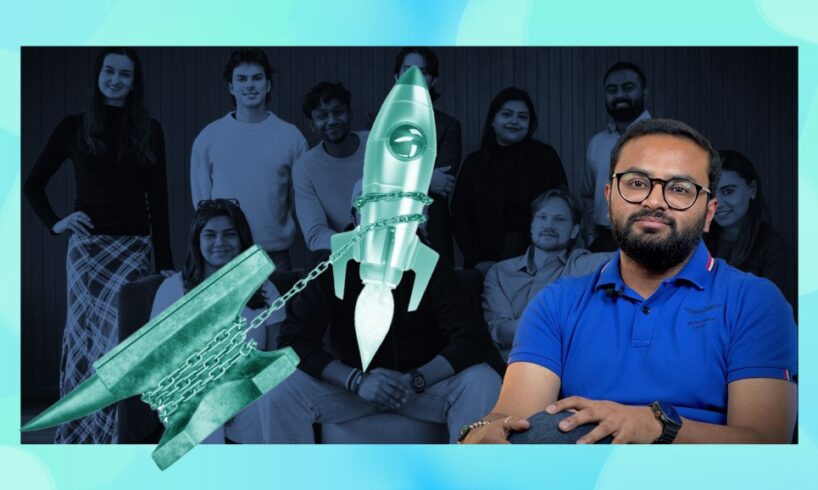
For Arjun Agarwal, the founder of impact investment startup Inaam, the journey to raising funds has been nothing short of grueling. “It’s been a journey. Oh my god,” he says with a sigh that carries both exhaustion and pride.
After years of pushing through, Inaam closed a $500,000 pre-seed round last week, revealed exclusively by SmartCompany. The funding round included participation from Startup Bootcamp, Hatcher+, and a few family offices, providing the crucial backing Agarwal needed to launch the impact investment platform he has been building since 2020.
Related Article Block Placeholder
Article ID: 325012
But getting here has been far from easy — especially as a South Asian Australian founder trying to build a fintech company in Australia.
“Maybe I’d be one of two, maybe three, South Asian fintech founders, probably the only one who you can say has a fund,” he told SmartCompany.
“It’s a big deal to have a fund… It shouldn’t be as difficult, but there’s regulation, there’s compliance, et cetera.”
Smarter business news. Straight to your inbox.
For startup founders, small businesses and leaders. Build sharper instincts and better strategy by learning from Australia’s smartest business minds. Sign up for free.
By continuing, you agree to our Terms & Conditions and Privacy Policy.
Inaam’s fund — a regulated, multi-class unit trust — allows customers to invest in impact-driven portfolios while tracking positive outcomes such as trees planted, animals saved, renewable energy generated, and carbon emissions prevented.
The founder says the startup’s mission is to make ethical investing accessible and transparent for everyone. Yet, bringing that vision to life as a migrant founder has meant confronting several uncomfortable truths about Australia’s startup ecosystem.
“It’s one of the hardest things to do,” Agarwal admits. “There are a lot of systemic and non-systemic challenges to building a business in Australia.”
The visa conundrum for migrant entrepreneurs
Among the biggest challenges: the visa process. For migrant founders, the struggle to maintain the right visa while trying to build a company can feel like fighting two battles at once — survival and innovation.
“Every six to 12 months, you’re waiting on a visa outcome,” says Agarwal. “You can’t plan ahead, you can’t fundraise properly, and investors hesitate because of that uncertainty.”
In Agarwal’s case, it meant juggling startup life with sponsorship paperwork, legal fees, and constant anxiety about whether he’d be allowed to stay in the country to run the business he was building.
“I’ve had investors ask what happens if my visa isn’t renewed. That’s not a question most white founders ever get.”
Agarwal is still awaiting a decision on his application for the Global Talent Visa, despite a roll call of achievements.
Related Article Block Placeholder
Article ID: 272214
“I have a TEDx Talk. I’m on the [SAARI Collective] 101 Founder list. Sure, I don’t have a Nobel Peace Prize or a Pulitzer Prize, [but] I’ve been invited to speak in Davos. I still don’t qualify for a Global Talent Visa.”
Agarwal believes Australian visa income thresholds don’t take startup founders into account.
“I think the threshold is $160-$170,000… Even if it’s a Blackbird-founded startup, I don’t think any CEO or founder is taking a $170,000 paycheck out of a startup in Australia,” he said.
“So I’m really not sure who those pay thresholds were made for, and you need to be backed by, say, an Infosys… Talent visas are cited for entrepreneurship, but are actually for people in high-paying jobs.”
The Global Talent visa closed to new applications on December 6, 2024, and has since been replaced by the invite-only National Innovation visa.
Systemic biases in fundraising
Agarwal boasts global experience — he was born in India, raised in South Africa, and has worked across finance, education, and investment banking — but he found raising capital in Australia far tougher than anticipated.
“There isn’t a lack of capital,” he explains, “but a very big lack of risk-tolerant capital”.
Related Article Block Placeholder
Article ID: 276471
Australia’s VC landscape, he points out, is oligopolistic: “We have three really big ones. Like, we have four big supermarkets, three big banks, etc. We have three big VCs.”
And that concentration, Agarwal says, has real consequences.
“You can look at the types of founders they have in their portfolios, the gender mix, the cultural mix, the ethnic mix — and there’s a very clear bias of where funding is going.”
Agarwal describes being told bluntly by investors, “You’re not from here. What do you know about building a business in Australia?” In his experience, the barriers compound for founders who don’t fit the mould — brown, with immigrant backgrounds, and building in the hyper-regulated world of fintech.
“We applied twice to the biggest accelerator in the country,” he says. “The only fintech that made it that year was a team of two people from Bondi who insured your luxury handbags. There is a very clear bias around what does get funded, who does get funded, and why they get funded.”
Agarwal is a seasoned entrepreneur — he co-founded and built South Africa’s first blockchain fund, and a research aggregation and automation system still used by a major investment bank. However, he’s repeatedly been labelled a “first-time founder”.
Related Article Block Placeholder
Article ID: 311566
“I’ve probably spoken to all of them,” he says of Australia’s fintech investors. “I’ve been told no by over 100 investors. I’ve been told I’m not from here. I’ve been told I don’t understand the market.”
He recalls even being told that potential investors were “conflicted out” — because they had already invested in adjacent companies. “These are not really valid reasons,” he says. “Just tell me you don’t want to invest.”
Highlighting the need for more diverse companies to increase competition, Agarwal added: “We’ve seen this in the UK, in India, in the rest of Europe, where you need to ignite the fire, you need to have that competition to see who gets out there first”.
The experience, while frustrating, has crystallised his resolve to change the system from within.
“The real support founders need is capital. The capital enables all the other support to make sense. None of it’s going to matter if there’s no capital.”
That’s why Agarwal says Inaam plans to reinvest a significant portion of its profits back into the ecosystem — specifically to fund women of colour, other people of colour, and young founders from disadvantaged backgrounds who are often overlooked by traditional venture capital.
“There’s nothing wrong with their businesses. They’re doing phenomenal work. They just don’t get funding because they look different, they speak different, they seem different,” he says.
“They don’t fit the traditional mould.”
Agarwal is candid about how emotionally taxing the process has been. “It shouldn’t have taken five years for a pre-seed, D2C fintech to come to life,” he says. “But it has. And I’ve been told no, over and over again. Still, I didn’t stop.”
Through it all, his conviction remains unshaken — not because it’s been easy, but because he’s lived the problem he’s trying to solve.
“This could still fail,” he says. “But giving up before I bring it into the world would be a disservice. My job is to make sure it comes to life. What happens after that — we’ll give it our best shot.”





